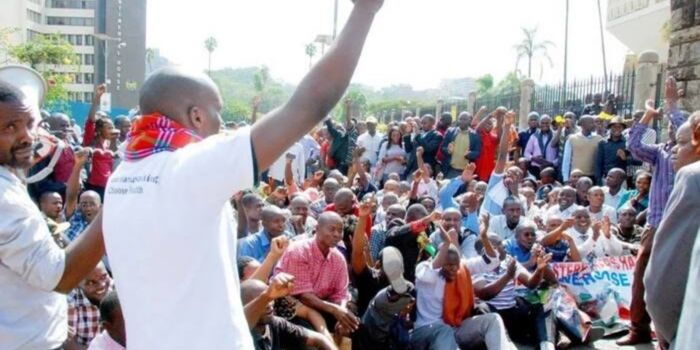Teachers across Kenya could soon down their tools after the Kenya National Union of Teachers (KNUT) issued a firm warning of a looming nationwide strike.
The union’s Secretary General, Collins Oyuu, on Friday, July 25, declared that the government must act fast and honour the recently signed Collective Bargaining Agreement (CBA) or face massive disruption in schools.
This warning comes just as the country is grappling with the shocking announcement that free basic education may no longer be viable. The CBA in question was signed between the Teachers Service Commission (TSC), KNUT, the Kenya Union of Post Primary Education Teachers (KUPPET), and the Kenya Union of Special Needs Education Teachers (KUSNET).
It promises a much-needed salary boost for educators, with the total package estimated at Ksh33 billion.
As per the agreement, teachers in the highest job group (D5) were to receive up to Ksh167,415 monthly—a five percent increase. Meanwhile, the lowest-paid teachers, currently earning around Ksh23,000, would see their pay rise to about Ksh29,000, representing a 29.6 percent increase.
These revisions followed intense day-long discussions at the Kenya Institute of Special Education in Kasarani on Friday, July 18, between union officials and TSC representatives.
The new pay structure was to be rolled out in stages over five years, ending in June 2029, with an annual salary budget of Ksh8.4 billion. However, the initial phase was expected to be implemented immediately, with teachers anticipating their updated pay by the end of July.
In his address, Oyuu did not hold back in his criticism of the government’s decision to potentially scrap free education. He blamed the problem on reduced government funding (capitation) to schools and urged Members of Parliament to intervene.
He insisted that pulling back on free education would be a blow to many struggling families and warned it would undo decades of progress.
Treasury Cabinet Secretary John Mbadi, appearing before the National Assembly on Thursday, July 24, admitted that the government was struggling to keep up with the costs of free primary and secondary education.
He explained that rising student numbers and tight budget constraints had made the program financially unsustainable.
According to Mbadi, the capitation for each secondary school student would be reduced from Ksh22,244 to Ksh16,900. He further broke down the current government support as Ksh1,420 for primary school learners, Ksh15,042 for junior school students, and Ksh22,244 for senior secondary school learners.
However, due to limited fiscal space and new challenges in the education sector, maintaining or improving these figures was no longer possible—unless national revenue improves significantly.
With these two major issues—salary delays and education funding cuts—clashing head-on, Kenya’s education system could soon face a serious shake-up if swift action isn’t taken.
Join Gen Z New WhatsApp Channel To Stay Updated On time https://whatsapp.com/channel/0029VaWT5gSGufImU8R0DO30


